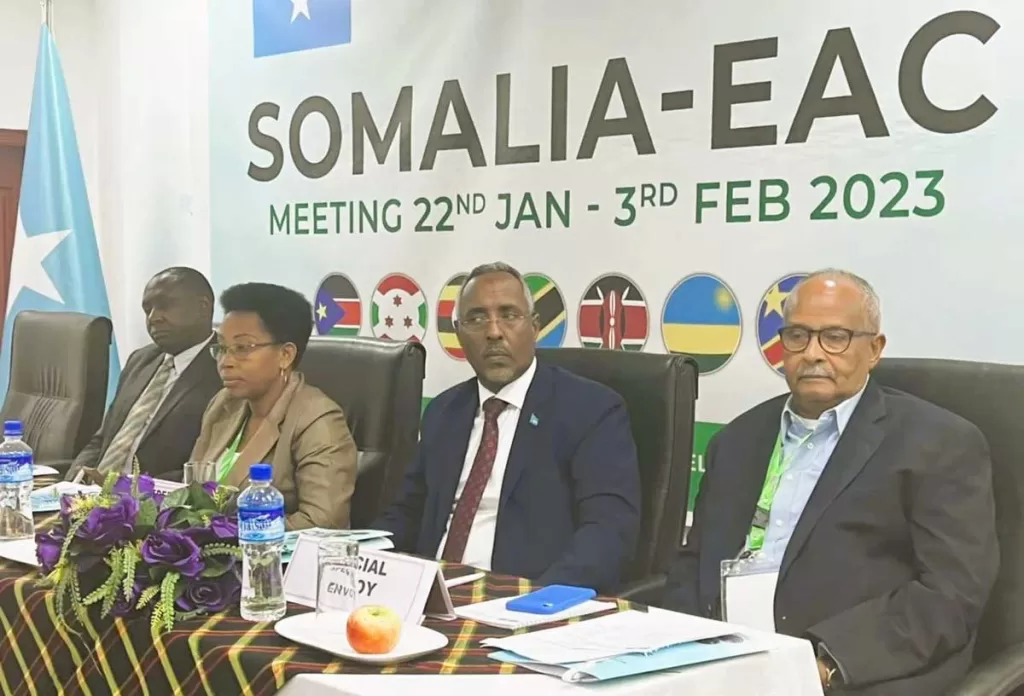Somalia had first applied to join EAC in 2012 but was declined due to insecurity and the lack of suitable legal stability. Somalia’s joining the EAC has been defined from different perspective, as the country seems to have been rushed with less preparation for competition with other member states. Another point of view is the urgency of the EAC in accepting Somalia membership application, considering that Somalia had not met the core criteria for the admission of a new member country according to Article 3 of the EAC Treaty; the criteria for the admission of new countries. The core criteria are adherence to universally accepted principles of good governance, democracy, the rule of law, observance of human rights and social justice.
The Somalia expectation in EAC
Security
The African Union Mission in Somalia (ATMIS) is expected to hand over its operation in late 2024. The departure will force the Somali army to take over the operations against Al Shabaab, a terrorist group that currently holds the Southern rural areas of Somalia. To a large extent, ATMIS succeeded in defeating Al Shabaab and overseeing the establishment of vital institutions in the country as well as taking over security responsibilities for the Presidential Palace, State House, Parliament, maritime ports, and airports. It is estimated that more than 23,000 soldiers and 32,000 police officers will be needed to fight Al Shabaab, thus requires finance as well as military logistical support, an issue that may not be easy for the Somalian government to handle at the moment. EAC may deploy military troop to the country as it did in the Congo DRC with the aim of fighting the rebel group M23, this time to encounter Al Shabaab insurgency and to stabilize peace in Somalia.
Food Crisis
Somalia is experiencing one of the world’s most challenging food crisis that has lasted for over three decades. Now climate change, conflict, and global politics have dramatically increased the food insecurity in the country. Tanzania has been reported as being the hub for food exportation in Africa. Somalia can benefit from this giant food producer through EAC bilateral trade agreements.
Investment
Being part of EAC, eventually it will solidify Somalia’s stability and confidence to attract FDI and trade globally. Somalia has a low level of human development and infrastructure compared to other EAC member states.
It is estimated that 70% of the population in Somalia live below the international poverty line (on less than $2.15 a day), low per capita gross domestic product (GDP) ($670), low level of literacy (41%), inadequate road and transport infrastructure (Of the 21,830 kilometers (13,564 miles) of roads in the country, only 2,860 kilometers are estimated to be paved (13%). Somalia’s economy relies heavily on international aid. Hence, the restoration of Peace and Security will foster the government to create an attractive environment for domestic and foreign investment (FDI).
Investment in the oil and gas exploration sector, especially considering Somalia has a coastline that lies more than 3,000 km between the Gulf of Aden and the Red Sea, making it the shortest route connecting Asia and Europe. After the oil and gas sanctions imposed by the U.S. and E.U on Russia due to its invasion of Ukraine, it made Western Asia as the world oil production powerhouse. For the first half of 2023, 12% of all globally traded oil from Western Asia went through the Somalia route, and 8% of natural gas (LNG) traded in that half passed through that route too. From the year 2020-to 2023, there has been an average increase of 60% in the transportation of oil through Somalia.
If security improves, the revenue from oil exploration and transportation will boost other sectors like agriculture, tourism, infrastructure and trade.
Millions of Somalis diaspora might return to invest in Somalia in targeting the 300 million people while it is expected that Ethiopia, Djibouti, and Sudan are set to become part of the EAC. Somalia’s economic stability will also increase political and social steadiness.
Somalia exports livestock, bananas, skins, fish, charcoal and the scrap metal, and the main export partners are the United Arab Emirates, Yemen and Oman. Kenya imports 76% of its fish consumption, so Somalia may join the race with Uganda and Tanzania in capturing the Kenyans’ fish market as EAC Article 75 gives room for the elimination of Non-tariff barriers, the simplification and harmonization of trade documentation and procedures between the member states.
Somalia-Ethiopia Dispute
Somalia is in diplomatic tension with Ethiopia regarding Somaliland MoU, a deal/agreement that Somalia has claimed as “null and void”. Somalia is expected to use the EAC member card to persuade other member states to oppose the recognition of the sovereignty of Somaliland within the AU if the issue is presented by Ethiopia.
Basically, Somalia has less to offer to the EAC than it can receive. It could be a great opportunity for the nation of 17 million people to revive its economy, continue to build and sophisticate its armed forces and improve its international relations. This can be termed as second stage of reconstruction of Somalia after its war with Al Shabaab.
